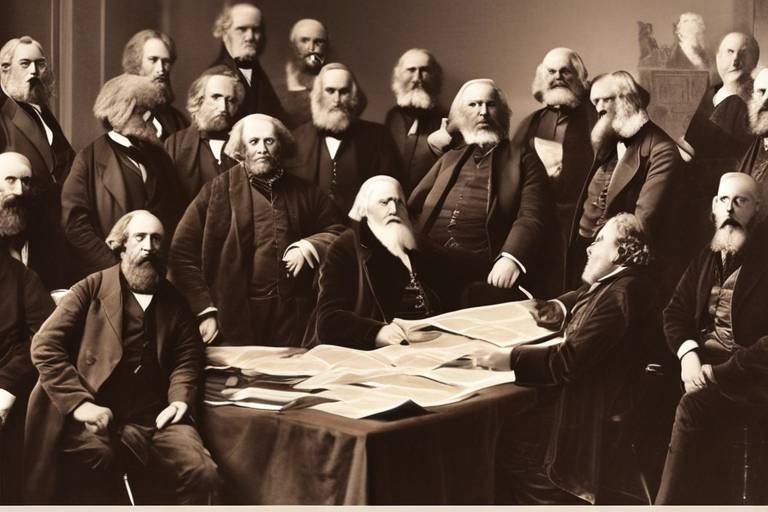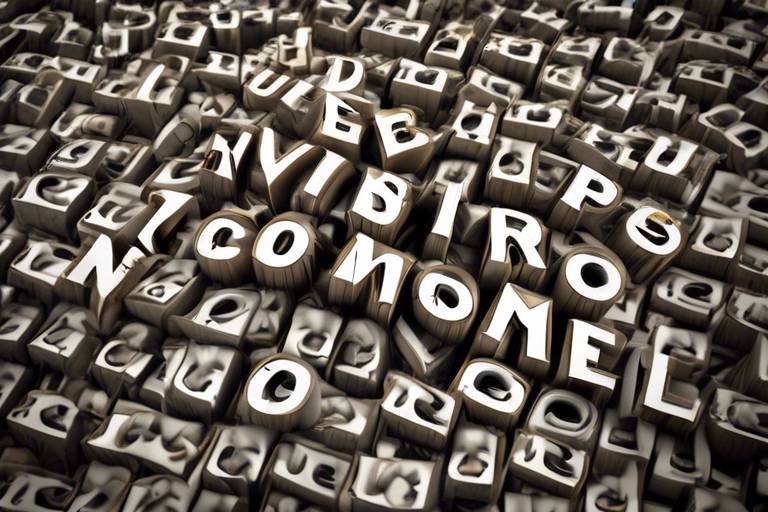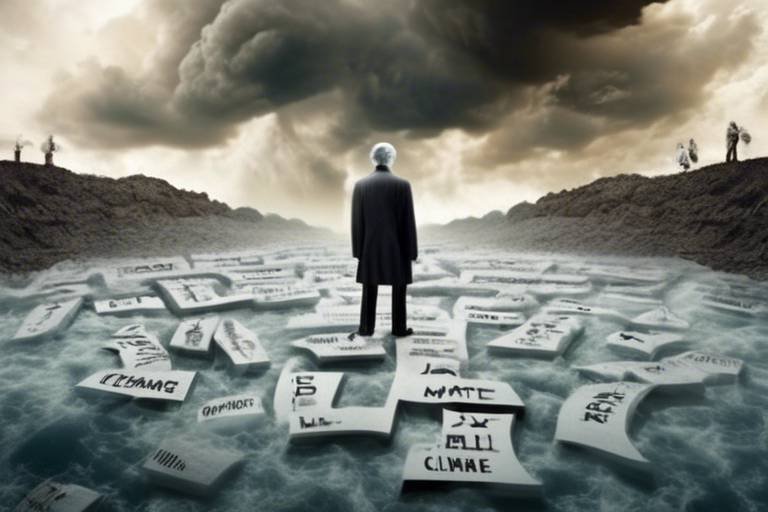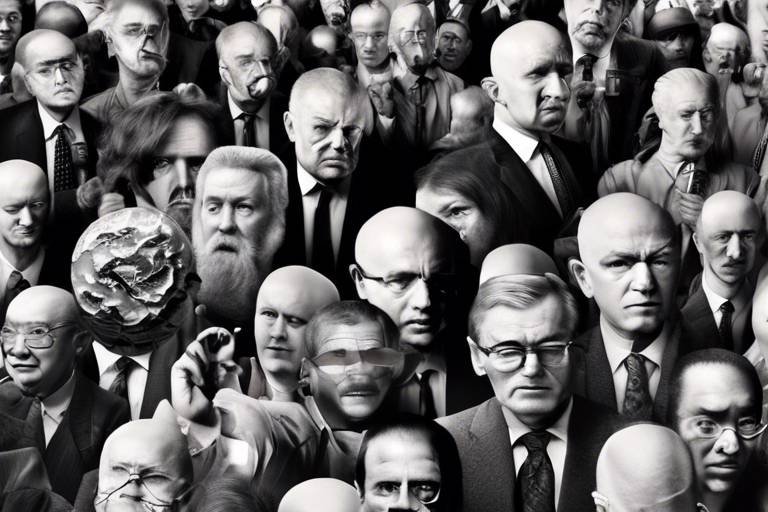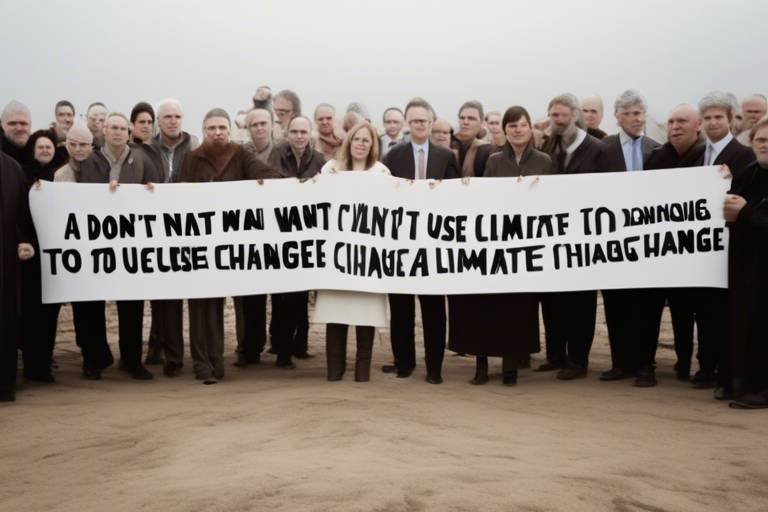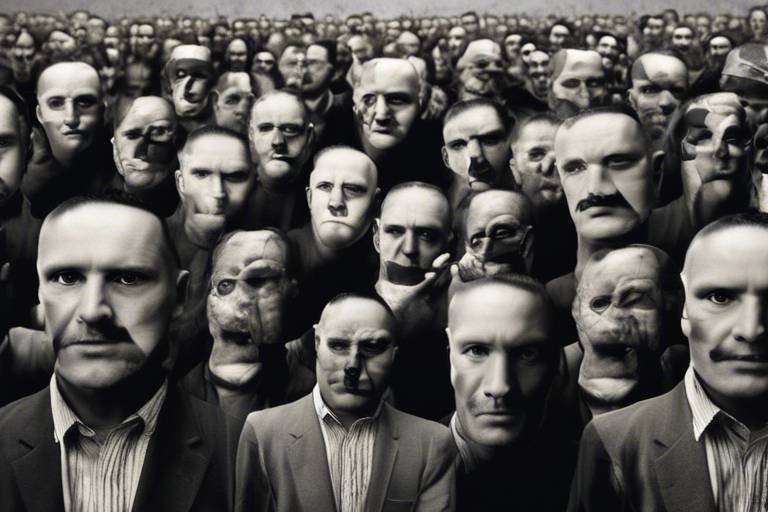The Role of Religion in Political Philosophy
Religion and politics have danced together throughout history, creating a complex tapestry that shapes societies across the globe. The influence of religion on political thought is not just a relic of the past; it continues to mold ideologies, governance structures, and ethical frameworks today. But how exactly does this interplay unfold? It’s a question that digs deep into the roots of our moral compass and societal norms.
At its core, religion often provides a set of values and beliefs that guide individuals in their decision-making processes, both personally and politically. Think about it: when leaders make decisions, they often reflect the principles instilled in them by their faith. This can lead to the development of laws and policies that resonate with the moral teachings of a particular religion, shaping the very fabric of societal governance. For instance, in many cultures, the concept of justice is heavily influenced by religious teachings, which can lead to laws that promote social welfare and equality.
However, the relationship between religion and political philosophy is not without its challenges. There is a constant tug-of-war between secular governance and religious influence. In some countries, secularism is embraced as a means to ensure that all citizens, regardless of their faith, have equal rights and freedoms. In contrast, other nations intertwine their governmental structures with religious doctrines, leading to a unique blend of faith and politics. This divergence raises critical questions: Can a society thrive under a secular regime, or does it need the guiding hand of religion to maintain moral order?
As we delve deeper into this topic, it’s essential to consider the historical perspectives that have shaped our understanding of political philosophy. From the ancient Greeks who pondered the role of the divine in governance to modern thinkers who challenge the relevance of religion in contemporary politics, the dialogue has been rich and varied. Indeed, the voices of key philosophers and movements have echoed through the ages, influencing how we perceive the relationship between faith and political authority.
In the end, the role of religion in political philosophy is a multifaceted issue that continues to evolve. As we explore this intricate relationship, we must remain aware of the ongoing debates surrounding the influence of faith in public policy and the implications for individual freedoms. The challenge lies in finding a balance that respects diverse beliefs while fostering a cohesive society.
- How does religion influence political ideologies?
Religion often provides a moral framework that shapes political ideologies, influencing how laws and policies are formed based on ethical beliefs. - What is the difference between secularism and religious governance?
Secularism advocates for the separation of religion from political affairs, while religious governance intertwines religious principles with state authority. - Can religion contribute to social justice movements?
Yes, many social justice movements have been fueled by religious beliefs that advocate for equality, human rights, and community welfare. - What challenges does religious extremism pose to political stability?
Religious extremism can disrupt social cohesion and governance, leading to conflict and instability in various regions.

Historical Perspectives
The intricate dance between religion and politics has been a defining feature of human civilization for centuries. From the ancient empires to modern democracies, the influence of religious thought has shaped political ideologies, governance models, and ethical frameworks. To truly understand this relationship, we must journey through time, examining key thinkers and movements that have woven the fabric of religious and political thought together.
In ancient societies, religion was often the backbone of governance. Take, for instance, the Egyptian pharaohs, who were considered divine figures, ruling not just as political leaders but as gods on earth. Their authority was legitimized by the belief that they were chosen by the gods to maintain order and justice. Similarly, in ancient Greece, philosophers like Plato and Aristotle explored the role of the divine in governance, laying the groundwork for future political philosophy. Plato's idea of the "philosopher-king" suggests that a ruler must possess both wisdom and virtue, qualities often linked to divine favor.
As we move through history, the influence of religion on politics continues to evolve. The rise of Christianity in the Roman Empire marked a significant shift. The Church became a powerful institution, influencing not just spiritual life but also political affairs. Figures like St. Augustine argued for the integration of faith and governance, positing that earthly rulers should reflect divine justice. This idea laid the groundwork for the concept of the Divine Right of Kings, which dominated European politics during the Middle Ages.
However, the Enlightenment brought a wave of new thought that challenged these traditional notions. Thinkers like John Locke and Thomas Hobbes began to advocate for secular governance, arguing that government should be based on reason rather than religious doctrine. Locke’s ideas on natural rights and the social contract emphasized the importance of individual liberty and the separation of church and state, setting the stage for modern democratic thought.
Throughout history, the relationship between religion and politics has also been characterized by conflict. The Reformation sparked a series of religious wars in Europe, highlighting the volatile nature of intertwining faith with governance. The Thirty Years' War, for example, was not merely a political struggle but also a profound religious conflict that reshaped the continent's political landscape.
In the contemporary world, the impact of religion on political philosophy is still palpable. Various movements, such as Islamism and Christian nationalism, illustrate how religious ideologies continue to shape political agendas. These movements often invoke a sense of identity and purpose, mobilizing followers around shared beliefs and values. As we navigate the complexities of modern governance, understanding these historical perspectives is crucial for comprehending the current political climate.
In summary, the historical interplay between religion and politics is a rich tapestry woven through centuries of thought and action. From the divine rule of pharaohs to the secular philosophies of the Enlightenment, each era has contributed to our understanding of how religious beliefs can shape, challenge, and inform political ideologies. As we continue to grapple with these issues today, it is essential to recognize the historical roots that inform our contemporary debates.
- How has religion influenced modern political thought? Religion continues to shape political ideologies, influencing laws and policies, especially in nations where faith plays a central role in cultural identity.
- What are some examples of religious governance? Countries like Iran and Saudi Arabia exemplify religious governance, where laws and political authority are deeply intertwined with religious doctrine.
- How does secularism impact society? Secularism promotes a separation between religion and state, allowing for a more inclusive approach to governance that respects diverse beliefs.
- What role does religion play in social justice movements? Many social justice movements draw on religious principles to advocate for equality and human rights, emphasizing the moral imperative to care for the marginalized.

Religion as a Moral Framework
Religion has long served as a moral compass for societies around the world, offering ethical guidelines that shape both individual behavior and collective governance. At its core, religion provides a framework through which people can discern right from wrong, often rooted in ancient texts and teachings that have been passed down through generations. This influence is not merely theoretical; it manifests in laws, policies, and social norms that govern daily life. For instance, many legal systems incorporate principles derived from religious teachings, such as the concept of justice, which is often echoed in both religious doctrine and secular law.
Consider how the Ten Commandments, a foundational aspect of Judeo-Christian ethics, have influenced Western legal systems. These commandments advocate for honesty, respect for others, and the sanctity of life—principles that resonate in modern legal frameworks. Similarly, in Islamic teachings, the concept of Sharia law provides a comprehensive guide for ethical conduct, influencing not only personal behavior but also the governance of societies. This intertwining of religion and morality raises important questions: How do these religious principles adapt to contemporary challenges? And can they coexist with secular moral philosophies?
Furthermore, religion often plays a pivotal role in shaping the ethical frameworks of political leaders. Many politicians invoke their faith when discussing policies, aiming to align their governance with the moral expectations of their constituents. This relationship can manifest in various ways, such as:
- Policy Formation: Decisions on issues like healthcare, education, and social welfare may be influenced by religious teachings.
- Community Engagement: Religious organizations often mobilize communities to advocate for social justice, drawing upon their moral authority.
- Legislation: Laws regarding marriage, family, and morality frequently reflect religious values.
However, the reliance on religion as a moral framework is not without its challenges. In increasingly diverse societies, the coexistence of multiple religious and secular moral perspectives can lead to tension. For instance, debates over abortion and same-sex marriage often pit religious beliefs against secular human rights, highlighting the complexities of governance in a pluralistic society. This tension raises the question: How can leaders navigate these moral landscapes to create inclusive policies that respect all beliefs?
Ultimately, the role of religion as a moral framework is both profound and multifaceted. It shapes not only individual ethics but also the broader political landscape. As societies evolve, the challenge lies in balancing these moral teachings with the need for inclusivity and respect for diverse perspectives. The conversation around religion and morality is ongoing, inviting continuous reflection and dialogue on how best to integrate these elements into a cohesive societal framework.
- How does religion influence laws in secular societies?
Religion often influences the moral underpinnings of laws, even in secular societies, by providing a shared ethical framework that informs public opinion and legislative processes. - Can secular and religious moral frameworks coexist?
Yes, many societies successfully navigate the coexistence of secular and religious moral frameworks, fostering dialogue and respect among diverse beliefs. - What role does religion play in social justice movements?
Religion often serves as a motivating force in social justice movements, providing a moral basis for advocating equality and human rights.

Secularism vs. Religious Governance
When we talk about secularism and religious governance, we're diving into a complex and often contentious debate that shapes the very fabric of societies around the globe. At its core, secularism advocates for a separation between religion and state affairs, suggesting that governance should be based on reason and universal principles rather than religious doctrines. Imagine a world where laws are crafted based on rational discussions and empirical evidence, rather than ancient texts. This approach aims to create a neutral space where individuals of all faiths—and those without faith—can coexist peacefully.
On the flip side, religious governance intertwines political authority with religious leadership, where laws and policies are often derived from religious teachings. Countries like Iran and Saudi Arabia provide stark examples of this model, where theocratic principles guide political decisions. Here, the moral compass is dictated by religious texts, leading to a system where laws reflect the beliefs of a particular faith. While this can foster a strong sense of community and shared values among believers, it can also alienate those who do not subscribe to the same beliefs, raising questions about fairness and equality.
The tension between secularism and religious governance often manifests in various ways, impacting everything from individual freedoms to societal order. For instance, in secular states, citizens generally enjoy a wider range of freedoms, including the freedom to practice their religion—or not practice at all. However, in countries governed by religious laws, these freedoms can be significantly restricted. The challenge lies in finding a balance that respects religious beliefs while ensuring that governance remains inclusive and equitable.
To illustrate this tension, let’s consider a few key differences:
| Aspect | Secularism | Religious Governance |
|---|---|---|
| Source of Law | Human reason and universal ethics | Religious texts and doctrines |
| Individual Freedoms | Generally broader | Can be limited based on religious laws |
| Inclusivity | Encourages diverse beliefs | Often favors a particular faith |
| Role of Religion | Private matter | Integral to governance |
While secularism promotes a pluralistic society, religious governance can create a strong sense of identity among followers of a particular faith. This can lead to a more cohesive community, but it can also foster division between different religious groups. In some cases, this division can escalate into conflict, as seen in regions where religious extremism takes root. Thus, the debate continues: can societies thrive under a purely secular model, or do they need the moral guidance that religious governance provides?
Ultimately, the conversation about secularism versus religious governance is not just academic; it affects our daily lives, shaping the laws we live by and the freedoms we enjoy. As we navigate this complex landscape, it’s crucial to consider how each model impacts the social fabric of our communities and the rights of individuals within them.

Case Studies in Secularism
When we dive into the realm of secularism, it's fascinating to observe how various countries have navigated the intricate balance between governance and religion. Secularism, at its core, advocates for a separation of religion from political affairs, ensuring that state policies are not unduly influenced by religious doctrines. This approach can lead to a myriad of outcomes, both positive and negative, depending on the cultural and historical context of each nation.
One striking example is France, often heralded as a beacon of secularism. The French model, known as laïcité, emphasizes the neutrality of the state in religious matters. This principle was solidified during the French Revolution, aiming to prevent any single religion from dominating public life. The result? A society where citizens are encouraged to practice their faith privately, while public institutions remain free from religious influence. However, this strict separation has also led to tensions, particularly regarding the visibility of religious symbols in public spaces, such as the debate over wearing hijabs in schools. These discussions highlight the ongoing struggle to maintain a secular public sphere while respecting individual freedoms.
On the other hand, we have Turkey, a nation that has experienced a complex relationship with secularism since the early 20th century. Founded by Mustafa Kemal Atatürk, modern Turkey was established with a strong secular foundation, aiming to modernize and Westernize the country. For decades, secularism was enforced vigorously, with religious practices being largely confined to private life. However, in recent years, there has been a noticeable shift towards a more religiously influenced governance under the leadership of President Recep Tayyip Erdoğan. This transformation raises critical questions about the future of secularism in Turkey and its implications for democracy and individual rights.
Another notable case is India, a nation that embodies a different model of secularism. Here, secularism does not mean the absence of religion in public life; rather, it acknowledges the coexistence of multiple religions. The Indian Constitution guarantees freedom of religion and recognizes the importance of all faiths in shaping the nation's identity. However, this approach has not been without challenges. The rise of religious nationalism has sparked tensions and conflicts, particularly between Hindu and Muslim communities, showcasing the delicate balance that must be maintained to uphold secular principles while respecting diverse beliefs.
To better understand these case studies, let’s summarize their key features in the table below:
| Country | Secular Model | Key Features | Challenges |
|---|---|---|---|
| France | Laïcité | Strict separation of church and state, neutrality in public institutions. | Tensions over religious symbols in public life. |
| Turkey | State Secularism | Originally strong secular foundation, shifting towards religious governance. | Concerns about democracy and individual rights. |
| India | Pluralistic Secularism | Coexistence of multiple religions, freedom of faith. | Religious nationalism causing social tensions. |
These case studies illustrate that secularism is not a one-size-fits-all solution. Each country’s approach reflects its unique historical and cultural context, leading to various outcomes. As we continue to explore the implications of secularism in governance, it becomes clear that the dialogue between religion and politics is an ongoing journey, filled with both opportunities and challenges.
In conclusion, understanding these case studies allows us to appreciate the complexities of secularism in different societies. The balance between religious beliefs and state governance is delicate, and the lessons learned from these examples can provide valuable insights for nations striving for harmony in a diverse world.
- What is secularism? Secularism is the principle of separating religion from political, social, and educational institutions, ensuring that religious beliefs do not dictate state policies.
- Why is secularism important? Secularism is important because it promotes freedom of religion, equality among citizens, and prevents any one religion from imposing its beliefs on others.
- How does secularism affect governance? Secularism affects governance by ensuring that laws and policies are based on rational and universal principles rather than religious doctrines, which can lead to more inclusive and fair societies.
- Can a country be both secular and religious? Yes, a country can adopt a secular framework while allowing individuals to practice their religion freely, as seen in nations like India.
- What challenges does secularism face? Secularism faces challenges such as religious extremism, cultural pushback, and the politicization of religious identities, which can threaten social cohesion and individual freedoms.

Religious Governance Examples
When we delve into the realm of religious governance, we uncover a fascinating tapestry woven from the threads of faith and authority. Nations around the globe have adopted various forms of governance where religion plays a pivotal role, shaping laws, policies, and societal norms. One prominent example is Iran, where the political structure is heavily influenced by Islamic principles. The country operates under a system known as the Islamic Republic, where the Supreme Leader holds significant power, guiding both the state and its citizens according to Islamic law. This intertwining of religion and politics has led to a unique governance model that prioritizes religious doctrine over secular law.
Another notable case is Saudi Arabia, where the legal system is based on Sharia law. The monarchy, deeply rooted in Islamic tradition, governs with the belief that their authority is divinely sanctioned. This creates a societal structure where religious leaders hold considerable influence over political decisions, often prioritizing religious values in matters of governance. The implications of this system are profound, as it fosters a distinct national identity centered around Islamic teachings.
In contrast, Vatican City presents a unique instance of religious governance. As the spiritual and administrative center of the Roman Catholic Church, it operates as an ecclesiastical state. The Pope, as the head of state, enforces laws that reflect Catholic teachings, influencing not only the citizens of Vatican City but also millions of followers worldwide. This governance model raises intriguing questions about the balance of power and the intersection of faith and politics.
While these examples illustrate the potential benefits of a cohesive religious governance structure, they are not without their challenges. For instance, in Iran, the strict adherence to religious laws can lead to tensions with citizens who seek more personal freedoms and a secular approach to governance. Similarly, in Saudi Arabia, the rigid application of Sharia law can create disparities in gender rights and personal liberties.
To further understand the implications of religious governance, let’s take a look at a comparative table of these examples:
| Country | Type of Governance | Key Religious Influence | Challenges |
|---|---|---|---|
| Iran | Islamic Republic | Islamic Law (Sharia) | Limited personal freedoms, political dissent |
| Saudi Arabia | Absolute Monarchy | Islamic Law (Sharia) | Gender inequality, human rights concerns |
| Vatican City | Ecclesiastical State | Catholicism | Limited population, global influence |
As we analyze these examples, it's clear that while religious governance can offer a sense of unity and moral direction, it often grapples with the complexities of modern societal demands. The challenge lies in finding a balance where faith can coexist with the diverse needs of a populace, ensuring that governance remains inclusive and just.
- What is religious governance? Religious governance refers to a political system where religious principles and leaders significantly influence or dictate governmental policies and laws.
- How does religious governance affect personal freedoms? It can limit personal freedoms, particularly in areas like speech, gender rights, and lifestyle choices, depending on the rigidity of the religious laws applied.
- Are there benefits to religious governance? Yes, it can provide a strong moral framework and a sense of community identity, fostering social cohesion among followers of the same faith.
- Can secular governance coexist with religious beliefs? Absolutely! Many societies find ways to respect religious beliefs while maintaining secular laws that protect individual freedoms and rights.

Influence on Social Justice Movements
The intersection of religion and social justice movements is a fascinating and powerful dynamic that has shaped societies throughout history. Many of the most significant social justice initiatives have found their roots in religious beliefs, where faith has served as both a catalyst for change and a guiding moral compass. When we think about the civil rights movement in the United States, for instance, figures like Martin Luther King Jr. emerge as pivotal leaders who drew upon their Christian faith to advocate for equality and justice. His famous "I Have a Dream" speech resonated not only for its content but also for its deep spiritual underpinnings, illustrating how religious conviction can inspire a collective vision for a more just society.
Moreover, religious institutions often provide essential frameworks for organizing communities and mobilizing individuals around social issues. For example, many churches, mosques, and synagogues serve as meeting points for activists, offering not just a space for worship but also a platform for discussing societal challenges. This communal aspect of faith can transform passive belief into active participation, as congregants are encouraged to take tangible steps toward addressing injustices in their communities. The social teachings of various religions, such as the Christian doctrine of love and compassion or the Islamic principle of charity (Zakat), emphasize the importance of caring for the marginalized and advocating for the oppressed, thus aligning religious practice with social activism.
Another compelling aspect is the role of religious narratives in framing the discourse around social justice. Many religious texts contain stories that highlight the struggles against oppression and the pursuit of justice. For instance, the Exodus story in the Bible serves as a powerful metaphor for liberation, inspiring countless movements for freedom and equality worldwide. Similarly, the teachings of the Buddha on compassion and the alleviation of suffering resonate deeply with contemporary social justice advocates who seek to address systemic inequalities. These narratives not only provide moral justification for activism but also create a sense of shared purpose among diverse groups united by a common faith.
However, it is essential to recognize that the relationship between religion and social justice is not always straightforward. While many movements have drawn strength from religious beliefs, others have faced challenges when religious institutions resist change or uphold existing power structures. In some cases, interpretations of religious texts can be used to justify discrimination or inequality, leading to conflicts within faith communities themselves. This duality highlights the complexity of religion's role in social justice movements: it can be a source of empowerment and solidarity, but it can also present obstacles that activists must navigate.
To better understand the influence of religion on social justice movements, we can look at a few notable case studies:
| Movement | Religious Influence | Key Figures |
|---|---|---|
| Civil Rights Movement | Christianity, particularly the teachings of love and nonviolence | Martin Luther King Jr., Rosa Parks |
| Anti-Apartheid Movement | Christianity and African Traditional Religions | Desmond Tutu, Nelson Mandela |
| Women’s Rights Movement | Feminist theology and reinterpretation of religious texts | Sojourner Truth, Malala Yousafzai |
In summary, the influence of religion on social justice movements is profound and multifaceted. It can inspire individuals to advocate for change, provide a moral framework for action, and foster community solidarity. Yet, it also requires critical examination and dialogue to ensure that religious beliefs promote inclusivity and justice for all. As we navigate contemporary issues, understanding this relationship will be crucial in addressing social injustices and fostering a more equitable world.
- How has religion historically influenced social justice movements?
Religion has provided ethical frameworks, mobilized communities, and inspired leaders to advocate for change, as seen in movements like the Civil Rights Movement. - Can religion also hinder social justice efforts?
Yes, interpretations of religious texts can sometimes uphold existing power structures or justify discrimination, presenting challenges for activists. - What role do religious narratives play in social justice?
Religious narratives often frame the discourse around justice, providing moral justification and inspiring collective action among followers. - Are there modern examples of religion influencing social justice?
Recent movements, such as those advocating for climate justice and gender equality, often draw upon religious teachings to mobilize support and inspire action.

Contemporary Issues
In today's fast-paced world, the interplay between religion and politics is more pronounced than ever. As societies evolve, the role of faith in shaping public policy, advocating for religious freedom, and responding to the challenges posed by globalization has become a focal point of discussion. The contemporary landscape is rife with debates that not only highlight the significance of religious beliefs but also underscore the complexities that arise when these beliefs intersect with governance.
One of the pressing issues we face is how religion influences public policy. Various governments grapple with the challenge of accommodating religious beliefs while ensuring that policies remain inclusive and equitable. For instance, in many democratic nations, the principle of separation of church and state is often tested by the demands of religious groups advocating for laws that reflect their beliefs. This tension raises crucial questions: Should laws be influenced by religious morals? How do we balance the rights of religious groups with those of secular citizens?
Moreover, the concept of religious freedom is under scrutiny in numerous parts of the world. While many countries tout their commitment to freedom of belief, the reality can be starkly different. In some regions, laws and societal norms actively discriminate against certain religious groups, leading to unrest and conflict. The challenge lies in fostering an environment where everyone can practice their faith without fear of persecution. This is particularly vital in multicultural societies where diverse beliefs coexist.
As we navigate through these contemporary issues, the impact of globalization cannot be overlooked. The global exchange of ideas and cultures has led to a rich tapestry of beliefs but has also resulted in tensions. In many cases, the influx of new ideas challenges traditional religious views, prompting a reevaluation of long-held beliefs. This dynamic can lead to a resurgence of fundamentalism as groups seek to defend their values against perceived threats. The question then arises: how can societies adapt to these changes while maintaining harmony?
To illustrate the complexities of these issues, consider the following table that outlines various contemporary challenges related to religion and politics:
| Contemporary Issue | Description | Implications |
|---|---|---|
| Public Policy | Influence of religious groups on legislation | Potential conflicts between secular and religious laws |
| Religious Freedom | Discrimination against minority faiths | Social unrest and conflict |
| Globalization | Clash of traditional beliefs with modern ideas | Rise of fundamentalism and radical views |
In addition to these challenges, the intersection of religion and identity politics adds another layer of complexity. In many societies, religious affiliation plays a significant role in shaping political alliances and influencing electoral outcomes. Voters often align themselves with candidates who share their religious beliefs, which can lead to polarization and division. This phenomenon raises an essential question: how do we foster dialogue and understanding in an increasingly divided political landscape?
Finally, we cannot ignore the impact of religious extremism on political stability. In various regions, radical beliefs have led to violence and unrest, posing significant challenges to governance and social cohesion. Governments must navigate these turbulent waters carefully, balancing the need for security with the protection of individual freedoms. The struggle against extremism often requires a multifaceted approach that includes community engagement, education, and dialogue.
- How does religion impact public policy? Religion can influence laws and regulations, especially when religious groups advocate for specific moral viewpoints.
- What is the significance of religious freedom? Religious freedom is vital for ensuring that individuals can practice their beliefs without fear of persecution, fostering a more inclusive society.
- How does globalization affect religious beliefs? Globalization can challenge traditional beliefs, leading to both a blending of cultures and a resurgence of fundamentalism as communities seek to protect their values.
- What role does religion play in identity politics? Religious affiliation can significantly shape political alliances, often resulting in polarized views and divisive electoral outcomes.
- What are the dangers of religious extremism? Religious extremism can lead to violence and instability, posing challenges to governance and social harmony.

Religion and Identity Politics
In today's world, the interplay between religion and identity politics is more pronounced than ever. As individuals navigate their political landscapes, their religious affiliations often shape their political identities, influencing everything from voting behavior to party loyalty. Have you ever wondered how your beliefs might sway your political views? For many, their faith is not just a personal matter; it becomes a crucial element of their public persona. This phenomenon is particularly evident in diverse societies where multiple religions coexist, creating a vibrant yet complex political tapestry.
At the heart of identity politics lies the idea that groups of people with shared characteristics, such as religion, ethnicity, or gender, can band together to advocate for their interests. When religion enters the mix, it adds an additional layer of complexity. For example, in countries like India, religious identity plays a pivotal role in shaping political alliances and electoral outcomes. Political parties often appeal to specific religious groups, tailoring their messages to resonate with the values and concerns of those communities. This strategy can lead to a sense of empowerment among religious groups but may also foster division and conflict.
One striking example of this dynamic can be seen in the United States, where the rise of the Religious Right has significantly impacted the Republican Party. Evangelical Christians, who make up a substantial portion of the electorate, have leveraged their religious identity to influence policy decisions on issues ranging from abortion to marriage equality. This has not only solidified their political power but has also polarized the political landscape, creating a chasm between those who share their beliefs and those who do not.
Moreover, the connection between religion and identity politics can lead to both positive and negative outcomes. On one hand, it can mobilize communities around shared values, fostering a sense of belonging and collective action. On the other hand, it can also lead to exclusionary practices, where individuals are judged or marginalized based on their religious beliefs. This duality raises important questions about the role of religion in fostering inclusivity versus promoting division.
As we delve deeper into the implications of religion on identity politics, it’s essential to consider how globalization is reshaping these dynamics. In our interconnected world, individuals are exposed to a multitude of beliefs and practices, which can either dilute traditional religious identities or reinforce them. For instance, young people in urban areas may find themselves at the crossroads of various religious and cultural influences, leading to a more fluid understanding of their identity. This fluidity can challenge established political norms and encourage new forms of activism that transcend traditional religious boundaries.
In conclusion, the relationship between religion and identity politics is a complex and evolving landscape. As individuals continue to navigate their political identities, the influence of religion will undoubtedly remain a significant factor. Understanding this relationship is crucial for anyone seeking to comprehend the current political climate and the forces that shape it. It’s a reminder that our beliefs, whether we acknowledge it or not, play a critical role in how we engage with the world around us.
- How does religion influence political affiliation?
Religion often aligns individuals with specific political ideologies or parties, as shared beliefs can create a sense of community and common purpose. - Can identity politics be beneficial?
Yes, identity politics can empower marginalized groups to advocate for their rights and interests, fostering social change and representation. - What are the risks of intertwining religion with politics?
When religion and politics collide, it can lead to exclusion, discrimination, and social division, undermining the principles of democracy.

Religious Extremism and Political Stability
In today’s world, the phenomenon of religious extremism poses significant challenges to political stability across various regions. Extremism, often characterized by fervent adherence to specific religious beliefs, can lead to radical actions that disrupt social harmony and undermine governance. When individuals or groups prioritize their religious ideologies above all else, it creates a rift between differing communities, often resulting in violence, discrimination, and social unrest. This tension can escalate into larger conflicts, threatening not only local peace but also regional stability.
One of the most alarming aspects of religious extremism is its ability to exploit political vulnerabilities. In societies where governance is weak or corrupt, extremist groups can gain traction by presenting themselves as protectors of the faith or champions of justice. They often fill power vacuums, offering services and support that the state fails to provide. This dynamic can lead to a cycle of violence, where extremist actions provoke harsh governmental responses, further alienating communities and perpetuating a cycle of conflict.
Moreover, the impact of religious extremism is not confined to the immediate area of conflict. It can have ripple effects that destabilize neighboring regions and even influence global politics. For instance, the rise of extremist groups in one country can lead to increased tensions in surrounding nations, prompting military interventions, refugee crises, and international diplomatic challenges. The interconnectedness of our world means that the consequences of religious extremism can be felt far beyond the borders of the affected countries.
To illustrate the impact of religious extremism on political stability, consider the following table that outlines key examples from around the globe:
| Country | Extremist Group | Impact on Stability |
|---|---|---|
| Afghanistan | Taliban | Prolonged conflict; resurgence of authoritarian rule |
| Iraq | ISIS | Destabilization; sectarian violence |
| Nigeria | Boko Haram | Widespread violence; humanitarian crisis |
| Yemen | Al-Qaeda in the Arabian Peninsula | Ongoing civil war; regional instability |
Addressing the challenges posed by religious extremism requires a multifaceted approach. Governments must not only enhance security measures but also engage in dialogue with various religious communities to foster understanding and tolerance. Education plays a crucial role in this endeavor, as it can help counteract extremist narratives by promoting critical thinking and inclusivity. Additionally, international cooperation is vital, as no single nation can tackle the complexities of religious extremism alone.
Ultimately, the relationship between religious extremism and political stability is intricate and fraught with challenges. As societies continue to grapple with these issues, it is essential to foster environments that promote peace, understanding, and respect for diverse beliefs. Only then can we hope to mitigate the influence of extremism and build a more stable world.
- What is religious extremism? Religious extremism refers to the belief in and support for radical religious ideologies that often advocate for violence or intolerance towards other beliefs.
- How does religious extremism affect political stability? It can lead to social unrest, violence, and can destabilize governments, creating power vacuums that extremist groups may exploit.
- What can be done to combat religious extremism? A combination of education, community engagement, and international cooperation is crucial in addressing the root causes of extremism.
- Are there examples of countries affected by religious extremism? Yes, countries like Afghanistan, Iraq, Nigeria, and Yemen have faced significant challenges due to the influence of extremist groups.
Frequently Asked Questions
- How has religion historically influenced political philosophy?
Religion has played a pivotal role in shaping political thought throughout history. Many political philosophers have integrated religious principles into their ideologies, using them to justify governance and ethical frameworks. Thinkers like Augustine and Aquinas emphasized the moral authority of religion in political matters, while movements such as the Reformation brought about significant changes in governance by challenging existing religious and political structures.
- What is the relationship between religion and morality in politics?
Religion often serves as a moral compass for both political leaders and citizens. It provides ethical guidelines that influence laws and policies, shaping social norms within societies. For instance, many democratic societies have laws rooted in religious moral teachings, reflecting the belief that ethical governance stems from a higher moral authority.
- What are the main differences between secular and religious governance?
Secular governance separates religion from state affairs, promoting a system where laws and policies are made independent of religious doctrines. In contrast, religious governance intertwines political authority with religious principles, often leading to laws that reflect specific religious beliefs. This can create tension, as secular systems prioritize individual freedoms, while religious systems may prioritize adherence to doctrinal beliefs.
- Can you provide examples of secularism in practice?
Countries like France and the United States exemplify secular governance, where laws are designed to be neutral regarding religion. In France, the principle of laïcité ensures that public life remains free from religious influence, promoting equality among diverse beliefs. However, challenges arise in balancing respect for religious practices with the need for a secular public sphere.
- What are the implications of religious governance?
Religious governance can create a sense of community and shared values among citizens, as seen in countries like Saudi Arabia and Iran. However, it can also lead to restrictions on personal freedoms and the marginalization of those who do not share the dominant faith. The intertwining of religion and politics can foster social cohesion but may also result in conflict and discrimination.
- How has religion influenced social justice movements?
Religious beliefs have been a driving force behind many social justice movements. Faith-based organizations often advocate for equality and human rights, drawing on religious teachings to promote community welfare. For example, the Civil Rights Movement in the United States was heavily influenced by Christian leaders who framed their struggle for equality as a moral imperative.
- What contemporary issues involve religion and politics?
Today, the intersection of religion and politics is a hot topic, with debates surrounding religious freedom, the role of faith in public policy, and the impact of globalization on religious political philosophies. Issues like immigration, healthcare, and education often bring religious beliefs into political discussions, reflecting the ongoing relevance of faith in shaping public life.
- How does religion intersect with identity politics?
Religious affiliation significantly shapes political alliances and influences electoral outcomes. In diverse societies, individuals often align their political identities with their religious beliefs, leading to the formation of coalition groups that advocate for specific interests. This intersection can empower communities but also polarize political discourse.
- What challenges does religious extremism pose to political stability?
Religious extremism can threaten political stability by fostering division and conflict within societies. Radical beliefs may incite violence or undermine social cohesion, making governance difficult. Addressing these challenges requires a nuanced approach that respects religious freedoms while promoting dialogue and understanding among different faiths.


